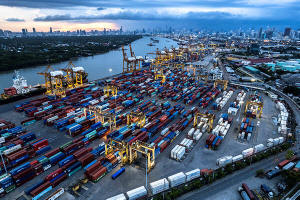Thai economy in recession, needs a boost -deputy Finance Minister
 Send a link to a friend
Send a link to a friend
 [January 29, 2024] By
Kitiphong Thaichareon and Orathai Sriring [January 29, 2024] By
Kitiphong Thaichareon and Orathai Sriring
BANGKOK (Reuters) -Thailand's economy is in a state of recession owing
to a high level of household debt, a deputy finance minister said on
Monday, raising pressure on the central bank to cut interest rates.
Deputy Finance Minister Julapun Amornvivat also said the government was
committed to delivering on its signature 500 billion baht ($14 billion)
handout plan of transferring 10,000 baht ($281) each to 50 million
Thais, and hoped a delay in its rollout would not be long.
He said the country's policy interest rate, which is at a decade-high of
2.50%, should be cut at the central bank's next policy review on Feb. 7
to help lower high borrowing costs.
"The rate should be lowered as high rates now are people's burden.
People can't survive," he told reporters.
Prime Minister Srettha Thavisin has also urged the central bank to cut
the key rate to help Southeast Asia's second-largest economy he says is
in crisis.
Bank of Thailand Governor Sethaput Suthiwartnarueput, who has come under
fire from the premier for not cutting rates despite negative inflation,
told Reuters last week growth had been slower than expected but the
economy was not in crisis.

Sethaput said the current policy rate was "broadly neutral".
The central bank left its policy rate unchanged at 2.50% at its last
rate meeting in November, having raised it by 200 basis points since
August 2022 to curb inflation.
The government last week slashed its 2024 growth projections for
Southeast Asia's second-largest economy to 2.8% from an earlier forecast
of 3.2% on weaker exports and lower foreign tourist numbers.
[to top of second column] |

A view of Bangkok's port along Chao Phraya River is photographed
during sunset in Bangkok, Thailand, July 19, 2022. REUTERS/Athit
Perawongmetha/File Photo

It also lowered the 2023 growth estimate to 1.8% from 2.7%, below
2022's 2.6% growth. Official 2023 gross domestic product (GDP) is
due to be released by the planning agency on Feb. 19.
"If you ask, now it's at the dangerous level. It's a kind of
economic recession," Julapun said, adding the situation was driven
by the high debt burden of households and the private sector.
"It's difficult to drive the economy forward. That's why we've seen
economic growth that has always been sluggish."
Julapun also said Thailand is planning to issue bonds overseas in
the next one or two years in dollar, yuan and yen to create
benchmarks for businesses to raise funds.
He said there would be a sale of government savings bonds worth
about 100 billion baht ($2.8 billion) in the 2024 fiscal year, with
the first batch of 40 billion baht in March.($1 = 35.5800 baht)
(Reporting by Orathai Sriring, Kitiphong Thaichareon and Satawasin
Staporncharnchai; Writing by Martin Petty; Editing by Raju
Gopalakrishnan)
[© 2024 Thomson Reuters. All rights
reserved.]
This material may not be published,
broadcast, rewritten or redistributed.
Thompson Reuters is solely responsible for this content.
 |